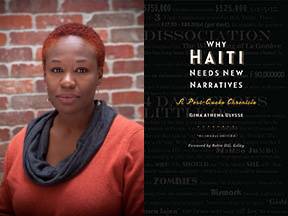January 12, 2015, marks the fifth anniversary of the catastrophic magnitude 7.0 earthquake that struck Haiti. The epicenter was near Léogane, approximately 16 miles west of the capital city, Port-au-Prince. By the January 24, 2010, at least 52 aftershocks measuring 4.5 or greater had been recorded. The death toll has been estimated at between 200,000 and 300,000 individuals lost. Hundreds of thousands of homes and commercial buildings were destroyed. In short, Haiti was devastated. Haiti—a country already in a precarious position given its centuries-long history of national debt, unfair trade policies imposed by outside nations, and the other, often unhelpful, foreign interventions.
Wesleyan University Press will release Why Haiti Needs New Narratives: A Post-Quake Chronicle in May of this year. The author, Haitian-American anthropologist Gina Athena Ulysse, makes sense of the discussions surrounding her homeland in the wake of the tragedy of the earthquake and its aftermath, including the battle against cholera, the mistreatment of Haitian women and children, and the nation’s ongoing political turmoil. As Robin D.G. Kelley points out in his foreword to the book, “Ulysse wants to know how we arrived at this point, when Haiti is treated much like the random bodies of homeless people, whose deaths we’ve come to expect but not mourn?” You can read an excerpt from Ulysse’s work here, a piece titled “Haiti’s Future: A Requiem for the Dying,” dated February 4, 2010.
As Ulysse makes clear, in order to have a meaningful discussion on the state of Haiti today, one must look to the past. On January 1, 1804, Jean-Jacques Dessalines declared Haitian independence—the outcome of a successful slave revolt. Although Haiti would now be free, France and other European powers forced the island nation to pay 150 million francs in reparations for the loss of “property” in slaves and land. Western powers refused to trade with Haiti, hoping to choke the life out of a black free state. Today, unfair trade practices continue to plague Haiti and its workforce—not to mention the long history of oppressive and genocidal acts committed against Haitians by the government of its neighbor, The Dominican Republic.
Ulysse also looks at the treatment of Haiti in both the press and popular media. Haiti is often, mistakenly, seen as a dark “other.” Voudou, the prominent earth-based religion of Haiti, is often mis-interpreted, mis-appropriated, and maligned as “Voodoo,” seen by European-Americans as a dark and dangerous power. While Haiti remains the poorest nation in the Western Hemisphere, to restrict the nation to dystopian narratives of desperation obscures the complexity of the republic and comes dangerously close to dehumanizing Haitians.
Why Haiti Needs New Narratives is largely a reaction to mainstream news coverage of the catastrophic quake of 2010. Ulysse observed that much coverage reproduced longstanding narratives of Haiti and stereotypes of Haitians. In response, she embarked on a writing spree that lasted over two years, and a resulted in a large body of dispatches, op-eds and articles on post-quake Haiti. As an ethnographer and a member of the diaspora, Ulysse delivered critical cultural analysis of geopolitics and daily life in Haiti, with the aim of making sense of how the nation and its subjects continue to negotiate sovereignty in a world where, according to a Haitian saying, tout moun se moun, men tout moun pa menm (All people are human, but all humans are not the same). Why Haiti Needs New Narratives contains thirty pieces, most of which were previously published in and on Haitian Times, Huffington Post, Ms Magazine, Ms Blog, NACLA, and other print and online venues. The book is trilingual (English, Kreyòl, and French) and includes a foreword by award-winning author and historian Robin D.G. Kelley. It will be published on May 25, 2015.
Today, Haiti continues to be rocked by political turmoil in the form of protests over the delay of elections. Read more about the protests, calling for the resignation of President Michel Martelly, here. The need for better infrastructure and health care continues. You can view recent photographs from Haiti, here, provided by Susan Schulman for The Guardian newspaper.







